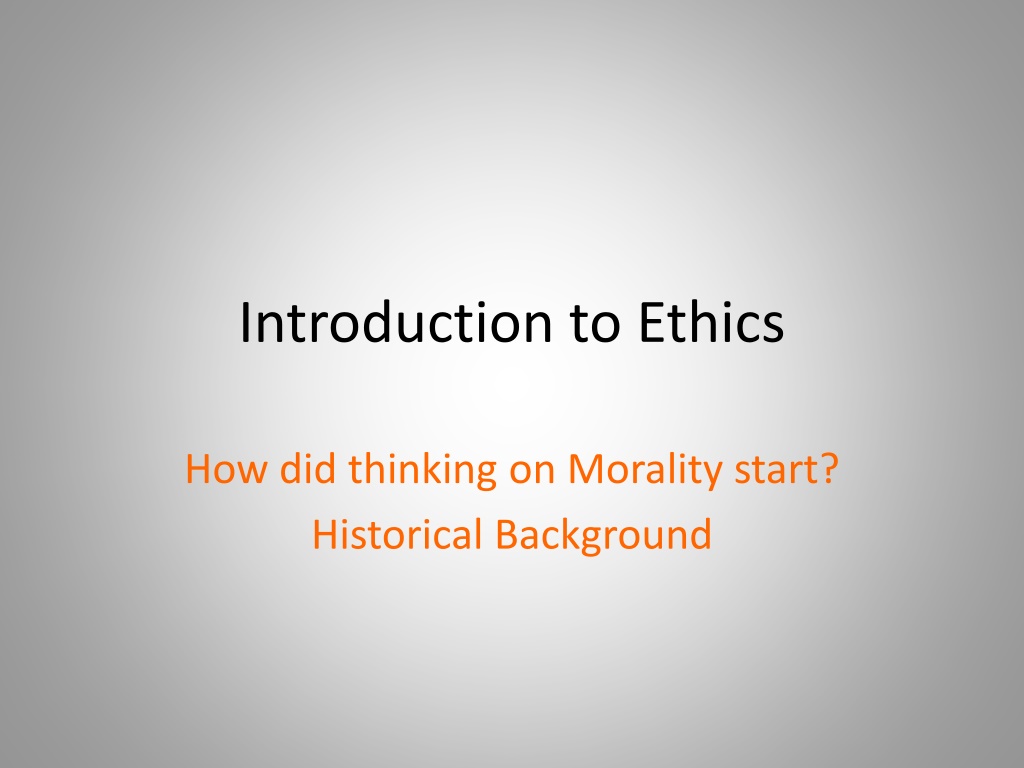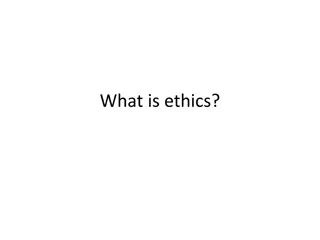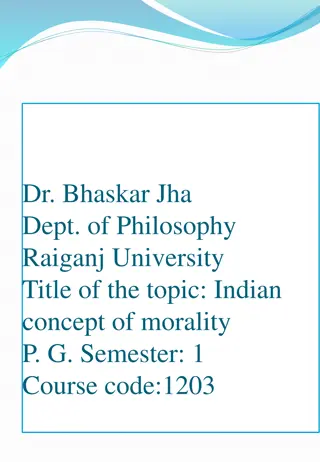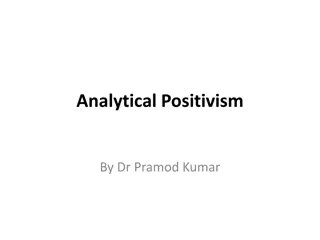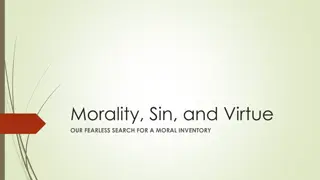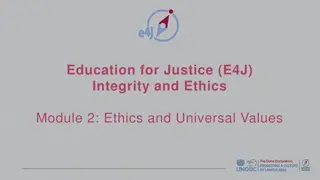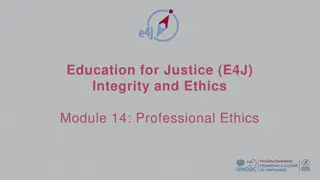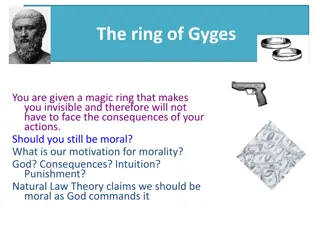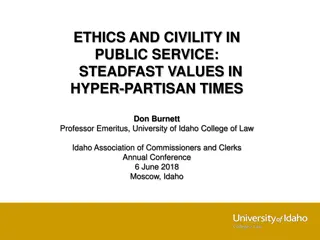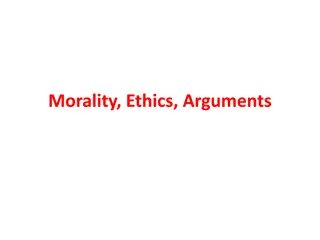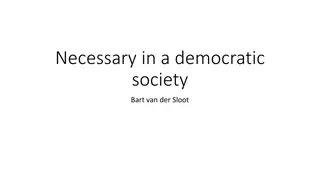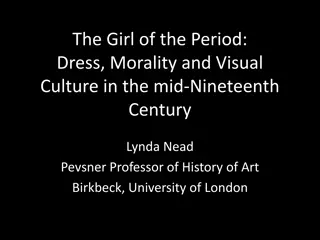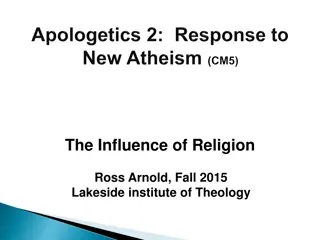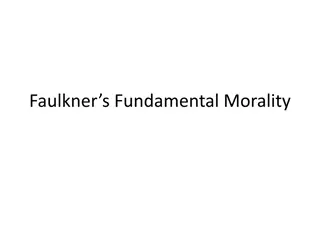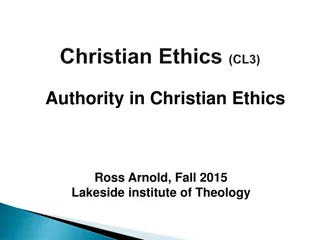Exploring the Origins and Diverse Perspectives on Morality
Explore the historical foundations of morality, from Plato's Ring of Gyges to Cultural Relativism, questioning the basis of ethical behavior and societal norms over time. Delve into philosophical debates that challenge our understanding of right and wrong, highlighting the complexities of moral reasoning across different cultures and perspectives.
Download Presentation

Please find below an Image/Link to download the presentation.
The content on the website is provided AS IS for your information and personal use only. It may not be sold, licensed, or shared on other websites without obtaining consent from the author. Download presentation by click this link. If you encounter any issues during the download, it is possible that the publisher has removed the file from their server.
E N D
Presentation Transcript
Introduction to Ethics How did thinking on Morality start? Historical Background
Plato and the Ring of Gyges Republic II No man would keep his hands off what was not his own when he could safely take what he liked out of the market, or go into houses and lie with any one at his pleasure, or kill or release from prison whom he would, and in all respects be like a God among men. Then the actions of the just would be as the actions of the unjust; they would both come at last to the same point. (Plato, Republic)
Plato and the Republic (Over 2300 years ago) Socrates and his pupil Glaucon/ Debate The ring of Gyges (the king of Lydia) G. Men restrained from unjust behaviors because of law and society (two rings, one for the just and another for the unjust (the impact of power) How would the virtuous man behave? G. unlimited powers blur the difference between just and unjust
Questions to think of Why shouldn t a person do what he pleases? Why shouldn t we do what we think is best for ourselves? What, if anything, justifies us in believing we morally ought to act in certain way and not the other?
Cultural Relativism (The truth depends on one s point of view)-No objective right and wrong Herodotus the Greek historian/ right or wrong are the products of ones society and costumes (all a matter of social conventions What is moral in one culture might be considered immoral in another Examples; Should we eat the bodies of the dead or burn them? Greeks Vs. Callatians. Consider the Eskimos. Marriage and Infanticide The men often had more than one wife, they share their wives with guests, lending them for the night as a sign of hospitality. A dominant male might demand and get regular sexual access to other men's wives. Female babies were especially liable to be destroyed with no social stigma attached to it. Old people also, when they became too feeble to contribute to the family, were left out in the snow .to die. All in all, the Eskimo practice was a volatile scheme that bore little resemblance to what we call marriage.
CR continued In those examples of cultural relativism there is no objective reason why some practices are more superior than others In some other practices, there are some good reasons why some are superior. For example: honesty and respect for human life are desirable, slavery and racism are undesirable When we can support our judgment about these matters with rational argument, we do not have to consider them as merely the expression of our particular society s moral code
Divine Command Socratic debate Moral living consists in obedience to divine commands If this is the case then Gyges should not be able to get away with what he did. To Socrates the right does not mean what the Gods demand. Time frame of the Divine Scriptures and contemporary issues (global warming, environmental preservation, should resources be allocated to AIDS research etc ) To Socrates there are two ways: either God s have a reason for the instructions they give or they don t. If they do not and instructions are merely arbitrary, they are like tyrants If they have good reasons, this means there is a standard of rightness independent of their commands/a standard that they refer to in deciding what to require of us. Therefore, rightness and wrongness cannot be understood according to their conformity to divine prescriptions.
Aristotle and the Virtues Relativism and DC were not popular to morality students. Aristotle offered a detailed account on virtues: main character traits people need to do well in life : Courage, prudence, generosity, honesty etc . The most imp. Virtue is happiness. To Aristotle, everything in nature exists for a purpose, nature belongs to the class of causes which act for the sake of something . Things we make or even natural causes have purposes. (Rain , animals etc ) To him the world is an orderly, rational system. Quote p. 6
Natural Law Ethics (Saint Thomas Aquinas 1225-1274) Catholic theologian Christian thinkers. For a complete picture, the addition of God was imp All is because of God s intention and what God made them for. The world is created according to a divine plan. At an ethical level the view affirms a supreme value of human life. Humans are entitled to do what they please with the rest of nature There is a way of how things ought to be, so when moving away form such natural purposes things become right or wrong Example: decayed teeth that cannot be used for chewing are defective, drought that deprives plants of rain is evil YET: Consequences for human action: (some forms of human behaviors are natural, others are not) Examples: Purpose of sex organ is for procreation hence homosexuality is wrong? marriage and reproduction is right Supporters within Catholic church not many outside.
Modern Science view on Morality NLE replaced with outlook of modern science (Galileo, Newton, and Darwin) natural phenomena without an evaluative notion. Rain does not fall for the plants, plants get typically the amount of water they need because each species evolved, by natural selection, in the environment in which such amount of water is available. Nature does not involve purpose-involving principles. Hence Aristotle s final causes and Christian Gods have nothing to do in explaining nature. This view condemned by the church.
The Social Contract ( A basic project in moral philosophy in the 17th century) Thomas Hobbs a British philosopher Based on the above theory, The world has no values of its own. If there is no moral facts and no God, what happens to morality? Ethics is a human phenomena that stems from the humans needs, products and desires. Good and bad are names for things we like and dislike/ disagreement is bound to happen. Since we are self interested creatures who care about living well, ethics arises in figuring out what to do and how to live well. We are better off living in cooperative society. Without social cooperation we lose all of the benefits.
Social Contract contd To achieve a cooperative society, adoption of certain rules of behaviors is necessary Example: Telling truth => communication Keeping promises =>good division of labor, economical development Assurances against murder assault etc => security. A need to establish mechanism for enforcing rules, legal sanctions that help obey rules. This social contract is the basis for morality and morality is the set of rules that rational people will agree to obey, for their mutual benefit, provided that other people will obey them as well . P. 9 Social contract explains why we should care about ethics and solves Gyges issue. If there is no God to punish us, why should we care about doing what is right if it is not in our advantage.
Assignment: Please read pages 9 and 10 for Thursday answering why social contract is more appealing than other frames of moral thought discussed so far? We will continue with historical background this week; Altruism and self-interest, Utilitarianism, Impartiality, and Kant.
Utilitarianism Is social interaction based solely on self- interest? Hume, we have social sentiments/feelings that make care about the welfare of others Right and wrong are measured by the true interest of mankind
Utilitarian Basic principles We should always do whatever will produce the greatest possible happiness over unhappiness for everyone who will be affected by our action. Based on the principle of utility combination of three ideas) To know what to do, we should be guided by the consequences of our actions To determine what is best, we should do whatever causes the most happiness and least unhappiness POFU, each individual s happiness is equally as important as everyone's else's.
Impartiality As part of the utilitarian thought. Although the goal is actions that cause more happiness than unhappiness Principle of Impartiality states that: From an objective view point, each one of us must acknowledge that our own perspective-our own particular set of needs, interests, likes, and dislikes-is only one among many and has no special status. p.17
Kant Morality is product of pure reason Morality stems from one ultimate principle doing one s duty , called categorical Imperative, which is not calculated by consequences. You have to contemplate the rule you will be following to do a certain act (called the maxim of the act) Then ask yourself if you would be willing for that rule to be followed by everyone all the time (making it a universal law) . If yes follow if not act is not permissible.
